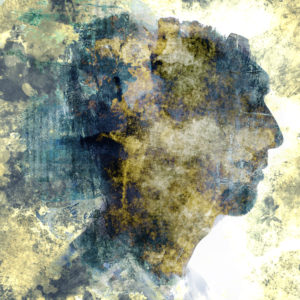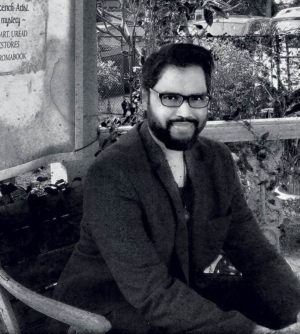You have no items in your cart. Want to get some nice things?
Go shopping 
Photographs are a waste, he used to rasp. All they do is steal some of your soul.
And so we never did take one together. Our rebellious hearts and our fragile umbilical cord of being soul brothers of sorts lay undocumented, vulnerable to the frailties of destiny and desire. I even refrained from taking one of him, alone, not wanting to leave his soul threadbare to the world.
All I had by way of proof were those cheap flyers from those bars he used to play in, the ones that smelt of desperation and hope long lost. The flyers used to carry his face and at times, even that felt like an infringement.
Other times there were posters. He never looked straight ahead, mind you. That gaze seemed distant and those eyes appeared hell-bent on avoiding the flash, that acidic burn of photographic filth and filament, adamant about keeping a sense of purity alive.
Everything’s a blur, he would growl, and documenting each and every blur of this mess that is our lives is, well, stupidity of cluster-fuck proportions, he’d finish with a flourish. But there’d always be a sparkle in the eyes as he said it; roguish charm is what they call it in novels.
Don’t let me lead you down the wrong road – he certainly wasn’t some sort of depression junkie dragging everyone around him down. There was laughter, there was mischief, there were escapades that used to find conclusion only at daybreak, there were romances soaked in the wine-drenched alchemy of lives left asunder, each varnished with brio and bristle.
We would get drunk on those nights when thunder used to cascade down from the mountains, our drunken monologues happily focussed on the women we had lost and the horizons we had messed up. Not quite wallow, more like wonder.
These sessions of dime store catharsis were almost always followed by a raucous duet or a newly constructed chorus, his voice soaring, freed from the constraints of stage and judgment, freed from glare and that white phosphene burn of the audience, free to soar out into the world with the freedom of a child recently discovering a lake besides his house.
While we discussed women, we stayed away from history. I think it was an adherence to transience, more than anything. The dizzying anonymity of small town lives, dawns dappled in the whiff of promise, the way a woman smelt when she first entered your world, the manner in which a fresh love affair lingered on your skin, all, in the end, such transience.
I guess it began to gnaw away at me, I’m not quite sure what it was. A sense of not knowing, a sense of not owning? Was it the need for identity, of some sort of verification that this deep, enriching bond even existed? Or was it just a poetic craving in the end, that desire to waft, to seek, to etch… to hold?
If you see her, say hello he sang that day, Dylan coursing through his blood in a firefly explosion of myth and murder. Boy, you could taste the electricity in that small square address of liquor and dark wood kissed with lavender, its patrons a curious assemblage of dance, desperation, denouements, and divinity.
If you see her, say hello, the voice trembled, and to think of how she left that night, it still brings me a chill, it reduced to a whisper, if you get close to her, kiss her once for me, it implored, ending in that fatal goodbye of sundown, yellow moon, I replay the past, I know every scene by heart, they all went by so fast…
My mind must have wandered over time. They began shouting as I was downing my whiskey, small. I rushed. The river behind that bar was still, save for a large body-shaped ripple that lay suspended. My feet lay moored to the wet soil, ironic this, since I had found it so hard so often to find any sort of anchor to this earth.
The river lay still, save for a large body-shaped ripple that lay suspended, in time, in space, in the drifting ghosts of lyrics and better days. Till even that was no more. People rushed towards the river, a few dived right in, their frantic heartbeats reverberating across the stubborn anchor that refused to untie me from the earth.
I removed a flyer from my pocket. I tore out his face, with care. My hand trembled. It reached further down into the pocket. What emerged was the pointless conclusion to my greed and my vacancies, that surreptitious photograph taken a few days earlier, another cheap little bar, his face and his eyes lost in the tremors of a song…
Flash. Burn. Gone.

Interview With Siddharth Dasgupta
Cat: Who was the reader you had in mind for this story?
SD: I had drunkards and lovers in mind, I had people tethered to a certain place and time in their lives in mind, I had people immersed in the poisonous kiss of poetry in mind… I had everyone, and no one in particular, in mind.
Cat: What were you doing when your best ever idea came to you?
SD: Many, perhaps far too many, of my characters and stories stem from travel; it is the primary crystal chalice that instigates me towards drink, and eventually, dive. Like a fisherman with all his odds and ends at arm’s reach, I feel it’s also best to be prepared – many an idea has come to me when I’ve simply had a pen in hand, doodling away or scrawling out incomprehensible lists. Both these influences were in play at a forsaken little café in Istanbul, resulting in the fulcrum of what was to become my soon-to-release short-story collection.
Cat: Are your ideas generated/borrowed/stolen?
SD: These thoughts and notions are generated through my own stumbles across alleyways and horizons tinged with the new, borrowed from the folds of time, history, and mystery, and stolen from what lingers between the lines of favourite writers; thus, I’m going to go with all three.
Cat: What do you do with an unconvincing piece of work? Rework/recycle/reject?
SD: Trash it. As with a relationship set to the notes of failure or a Hollywood big-budget with ‘a message’, there’s simply no sense in holding on.
Cat: Who do you admire in spades?
SD: I hold a deep sense of admiration for people who rage against the world and its assortment of scoundrels with a sprinkling of poetry in their steps and much mischief in their hearts. This includes family, loved ones, and a rolling cast of writers – novelist and poets – who make up for in prose what society sometimes lacks in poise.
Cat: Urban or rural? Domestic or exotic? Language or plot? First, second or third person?
SD: Cities instigate me; I find myself alert and engaged to their urban rhythms, to the cadence between their pasts and their presents. My stories, and the characters that shape them are usually bred from or inhabitants of a global canvas, while my narratives attached to India course through India’s wild, restless, sensual heart – so it would have to be exotic. While the plot is vital to the direction of my writing, it often plays a subservient role to language, watching sometimes, ruefully from a distance, as this rebel prances and preens about in its own inherited wealth. Finally, while much of my earlier writing was far more comfortable in the safe distance of the Third, the recent and current writing appears more at ease with the notion of the First, happily at ease with the vagaries of ‘I’.
Cat: What’s the best or worst rejection you’ve ever received?
SD: A literary journal editor once offered that a particular short story would work much better if I went about patching together random sentences from the first paragraph, through to the last. Pure gold.
Cat: What are your cardinal rules for writing flash fiction? How often do you bend them yourself?
SD: Write it in a flash. Don’t fuss, don’t fumble, don’t be finicky about that one sentence; just write the damn thing out – let it flow with abandon. Its immediacy and sense of fluid potency are what attracts many readers to Flash, and much of that, in turn, stems from it being written with a sense of immediacy and fluid potency. Another personal cardinal rule, unlike what I hold for my Narrative Fiction, is to write shorter sentences. This is a rule I relish breaking at regular intervals. Vive le Long!

About Siddharth Dasgupta
Siddharth Dasgupta is an Indian poet and novelist. His first novel, Letters from an Indian Summer, has met with consistent critical acclaim since its release in late 2014. His literature has appeared in Cha, Sunstruck, Coldnoon, Burning House, and Kitaab, amongst others; his travel stories meanwhile dot the likes of Travel + Leisure, Conde Nast Traveller, Eat Stay Love, Harper's Bazaar, and Just Luxe. This year sees the release of a Short-Story Collection in the Indian Subcontinent and Southeast Asia, to begin with (to be duly offered up elsewhere to the first publisher who plies him with martinis). A wild hybrid of poetry is also in the works. On any given day, Siddharth can be found chasing after the fleeting gravity of words and the poetic resonance of wild hearts, both of which have proven to be the best of confidantes.




